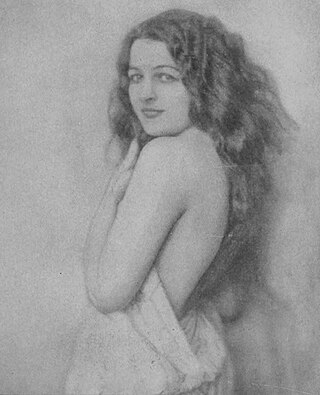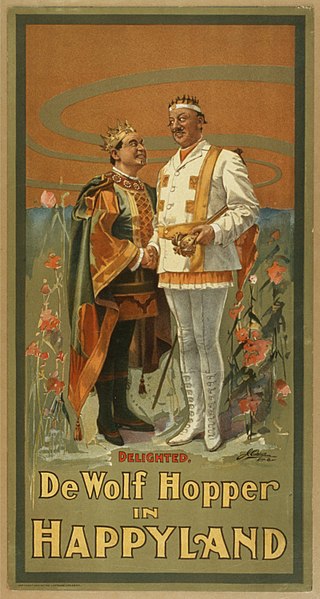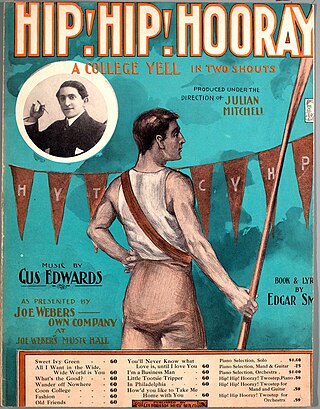Related Research Articles

The Gingerbread Man is a fairy tale about a gingerbread man's misadventures while fleeing from various people that culminates in the titular character being eaten by a fox. "The Gingerbread Boy" first appeared in print in the May 1875, issue of St. Nicholas Magazine in a cumulative tale which, like "The Little Red Hen," depends on repetitious scenes featuring an ever-growing cast of characters for its effect. According to the reteller of the tale, "A girl from Maine told it to my children. It interested them so much that I thought it worth preserving. I asked where she found it and she said an old lady told it to her in her childhood."

Oh, Lady! Lady!! is a musical with music by Jerome Kern, a book by Guy Bolton and P. G. Wodehouse and lyrics by Wodehouse. It was written for the Princess Theatre on Broadway, where it played in 1918 and ran for 219 performances. The story concerns an engaged young man, Bill, whose ex-fiancée arrives unexpectedly on his wedding day. Bill works to convince his old flame that he was not worthy to marry her, but his clumsy efforts do not make him look good to his new fiancée, whose mother already dislikes Bill. A couple of crooks cause further complications.
Around the Clock is a musical in three acts with music by Lee Orean Smith, a book by Steve B. Cassin, and lyrics by J. Sebastian Hiller. The work was created as a starring vehicle for the Scottish comedian Billie Ritchie. A successful "road musical" which premiered in 1906, the work toured extensively for several years for performances in the United States and Europe; including two stints at theaters on Broadway in 1906 and 1908. The show was still touring as late as 1913. Set in Philadelphia, the loose plot takes place inside a music hall and on a vaudeville stage.

A Parisian Model is a 1906 Edwardian musical comedy with music by Max Hoffman, Sr. to a book and lyrics by Harry B. Smith. The story concerns a dressmaker's model who comes into a fortune. It opened on Broadway in 1906, ran with success and toured. It was produced by Frank McKee and Florenz Ziegfeld Jr., and starred Anna Held, Ziegfeld's common law wife. Soon after the success of this piece, Ziegfeld would launch his famous series of Ziegfeld Follies revues.

Janet Velie was an American actress who was primarily known for her performances in Broadway musicals. She first came to prominence portraying the title roles in the musicals La La Lucille (1919) and Mary (1920), and then had success in the Ed Wynn music revues The Perfect Fool (1921) and The Grab Bag (1924). In 1925 she created the role of confidence woman Penelope Martin in Irving Berlin's The Cocoanuts; a role she reprised in 1927. She was the sister of actor Jay Velie and sometimes performed in productions with him. In addition to her work in theatre, she also appeared in a few short films.
Frederick J. Eustis, sometime referred to as F. J. Eustis, was an American composer, conductor, and theatre director. He is best remembered for writing music for several Broadway musicals.
China Rose is an operetta in two acts with music by A. Baldwin Sloane, and both lyrics and book by Harry L. Cort and George E. Stoddard. The work premiered on Broadway at the Martin Beck Theatre on January 19, 1925. In the midst of its Broadway run the production transferred twice, first to Wallack's Theatre and then the Knickerbocker Theatre. The production ended its run at the latter theatre on May 9, 1925; closing after 120 performances.

Louis Harrison was an actor, playwright, comedian, lyricist, librettist, and theatre director. As both a performer and playwright, he was mainly active within the genres of musical theatre and light opera.
Ernest Albert, born Ernest Albert Brown, was an American painter, illustrator, muralist, and scenic designer. He was a prolific scenic designer, first in Saint Louis and Chicago and then on Broadway. He is considered a major American landscape painter and was elected the first president of the Allied Artists of America in 1919.
Jack O'Lantern is a musical in two acts and 8 scenes with music by Ivan Caryll and both lyrics and book co-authored by Anne Caldwell and R. H. Burnside. The work also included some additional songs with music by Irving Berlin, Shelton Brooks and Gus King; and lyrics by Louis Harrison and Benjamin Hapgood Burt.
The Billionaire is a musical in three acts with music by Gustave Kerker, and both book and lyrics by Harry B. Smith. The show was written with the backing of producers Klaw and Erlanger and was made specifically for the talents of Jerome Sykes who portrayed "The Billionaire", John Doe. The action of the musical begins in Nice, France during Carnival where the billionaire Sykes meets a young American girl, Pansy Good, studying to be an actress. Impressed with her talents, he buys her Doe's Theatre in New York City and establishes her as a star. Later, Doe attempts to ride a horse in a race at the Longchamp Racecourse in Paris, but is too fat to succeed. Pansy rides the horse instead and wins the race.
The Errand Boy is a musical in two acts with lyrics by Edward P. Moore and a book by George Totten Smith. Created as a starring vehicle for vaudeville star Billy B. Van, the composer of the music for this work was never credited. Set in the town of Georges Mills, New Hampshire, the plot centers around the local errand boy Patsy Bolivar who becomes involved with a troupe of traveling performers stranded in his town.

Happyland, Or, The King of Elysia is a comic opera in two acts with music by Reginald De Koven and a libretto by Frederic Ranken.
Frederic G. Ranken was an American librettist, lyricist, and playwright for light operas and musicals staged on Broadway from 1899 through 1907. His greatest success was the libretto for Reginald De Koven's 1905 comic opera Happyland. He also wrote libretti for composers Victor Herbert and Ludwig Engländer, and was a lyricist for composers Alfred Baldwin Sloane and Gustave Kerker among others. As a playwright he wrote the books for several musicals.
Coming Thro' The Rye is a "satiretta" or musical in two acts with both lyrics and book by George V. Hobart and music by A. Baldwin Sloane and J. Sebastian Hiller.
The White Hen is a musical in two acts with music by composer Gustav Kerker, a book by Roderic C. Penfield, and lyrics co-authored by Penfield and Paul West. Set in Tyrol, Austria, the story takes place at an inn, 'The White Hen', owned by Hensie Blinder. The musical begins after Blinder returns from a trip to Vienna in which he engaged a matrimonial agency to help him find a wife. Upon his return to the inn, several women arrive in response to the advertisement placed by the agency and a comedy of errors ensues; including Blinder mistakenly believing he has committed the crime of bigamy.
Paul West was an American playwright, lyricist, newspaper editor, journalist, screenwriter, author, and talent agent. After working as a journalist in Massachusetts from 1888 to 1892, he began his career in the theatre as a press representative for Charles H. Hoyt; followed by a season as the business manager for the opera singer and actress Camille D'Arville and the comedian Frank Daniels. From 1898 to 1911 he worked on the editorial staff The New York Sunday World during which time be began a career as a prolific lyricist for both Broadway musicals and Tin Pan Alley publishers of popular song; publishing more the 500 songs during his lifetime. He also worked as a playwright, penning both plays and the books for several musicals. More than 15 of his stage works were mounted on Broadway between the years 1902–1913. In 1904 his children's book The Pearl and the Pumpkin was published; a work which he later adapted into a 1905 musical.

Hip! Hip! Hooray! is a musical in two acts with music by Gus Edwards and both lyrics and book by Edgar Smith.
The Rose of Algeria is a musical in two acts with music by Victor Herbert and both book and lyrics by Glen McDonough. The work features two songs which have become a part of the classical canon of concert repertoire, "Rose of the World" and "Twilight of Barakeesh". The work is set in the country of Algeria at an oasis in the Sahara desert and at a palace in the nation's capital, Algiers. First staged on Broadway under the title Algeria in 1908, the work was a critical failure in its original version. Believing the work was a strong one, Herbert made numerous revisions to the work after the original Broadway production closed. The revised version, now titled The Rose of Algeria, was mounted at Broadway's Herald Square Theatre in 1909 with a completely different cast and a new director. This second version was more successful with critics and audiences.
Leona Stephens, also known as Leona Hollister, Leona Stephens Hollister, Leona Hollister West, and Leona Stephens Hollister West, was an American actress, vaudeville performer, playwright, and songwriter who had an active career on stage and radio during the first half of the 20th century.